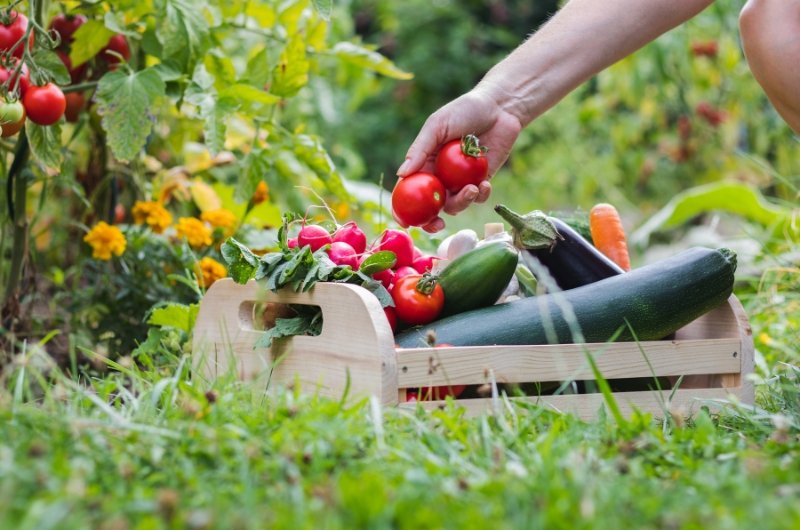Gardening is more than just a hobby; it’s a rewarding way to connect with nature, cultivate fresh produce, and enhance your outdoor space. However, maintaining a healthy garden can be challenging, especially with the increasing reliance on chemical fertilizers and pesticides.
Organic gardening offers a sustainable and eco-friendly alternative that promotes long-term soil health, supports biodiversity, and ensures that your plants thrive naturally. In this article, we’ll explore how you can boost your garden’s health with organic gardening practices.
1. Understanding Organic Gardening
Organic gardening is a method that focuses on growing plants without the use of synthetic chemicals. Instead, it relies on natural processes and materials to improve soil fertility, control pests, and promote plant health. The principles of organic gardening include:
- Soil health: Using compost and organic matter to enhance soil structure and fertility.
- Natural pest control: Encouraging beneficial insects and using organic pesticides.
- Crop rotation: Planting different crops in succession to prevent soil depletion.
- Water conservation: Using mulching and drip irrigation to reduce water usage.
By adopting these practices, you can create a garden that is not only productive but also environmentally friendly.
2. Building Healthy Soil
Healthy soil is the foundation of a thriving garden. In organic gardening, soil health is achieved by enriching the soil with organic matter, such as compost, manure, and cover crops. These materials provide essential nutrients, improve soil structure, and increase the soil’s ability to retain moisture.
- Composting: Composting is the process of recycling organic waste, such as kitchen scraps, leaves, and grass clippings, into a nutrient-rich soil amendment. Adding compost to your garden improves soil fertility, encourages beneficial microorganisms, and enhances plant growth.
- Mulching: Mulch is a layer of organic material, such as straw, wood chips, or leaves, that is spread over the soil surface. Mulching helps retain soil moisture, suppress weeds, and prevent soil erosion.
- Cover crops: Planting cover crops, such as clover or rye, during the off-season can prevent soil erosion, fix nitrogen, and add organic matter to the soil when they are tilled under.
3. Natural Pest Control
One of the biggest challenges in gardening is controlling pests without harming the environment. Organic gardening emphasizes natural pest control methods that protect your plants without the use of synthetic chemicals.
- Beneficial insects: Encouraging beneficial insects, such as ladybugs, bees, and predatory wasps, can help keep harmful pests in check. Planting flowers like marigolds, daisies, and sunflowers can attract these insects to your garden.
- Companion planting: Companion planting involves growing certain plants together to enhance growth and deter pests. For example, planting basil near tomatoes can repel tomato hornworms, while marigolds can deter nematodes.
- Organic pesticides: If pests become a problem, organic pesticides made from natural ingredients, such as neem oil or insecticidal soap, can be used as a last resort. These products are less harmful to beneficial insects and the environment than conventional pesticides.
4. Sustainable Water Management
Water is a precious resource, and conserving it is crucial for sustainable gardening. Organic gardening practices can help you use water more efficiently and reduce the impact on the environment.
- Drip irrigation: Drip irrigation systems deliver water directly to the plant roots, reducing evaporation and water waste. This method is more efficient than overhead watering and helps prevent fungal diseases caused by wet foliage.
- Rainwater harvesting: Collecting rainwater in barrels or cisterns allows you to use natural, untreated water for your garden. This not only conserves water but also reduces your reliance on municipal water supplies.
- Mulching: As mentioned earlier, mulching helps retain soil moisture by reducing evaporation. This means you’ll need to water less frequently, conserving water and saving time.
5. Encouraging Biodiversity
A diverse garden is a healthy garden. Organic gardening encourages biodiversity by promoting a variety of plants, insects, and wildlife that contribute to a balanced ecosystem.
- Plant variety: Growing a mix of plants, including vegetables, fruits, herbs, and flowers, can attract a wide range of pollinators and beneficial insects. This diversity helps prevent the spread of pests and diseases.
- Wildlife habitat: Creating a habitat for wildlife, such as birds, frogs, and beneficial insects, can help control pests naturally. Providing water sources, nesting sites, and native plants can encourage these animals to make your garden their home.
- Avoid monoculture: Monoculture, or planting a single type of crop over a large area, can lead to soil depletion and increased pest problems. Instead, practice crop rotation and intercropping to maintain soil health and reduce pest issues.
6. Using Organic Fertilizers
Fertilizing your garden is essential for plant growth, but synthetic fertilizers can harm the environment and disrupt soil health. Organic fertilizers, on the other hand, provide nutrients slowly and improve soil structure over time.
- Animal manures: Well-composted animal manures, such as cow, horse, or chicken manure, are rich in nutrients and organic matter. They can be applied to the soil to enhance fertility and promote healthy plant growth.
- Green manures: Green manures are cover crops that are grown specifically to be tilled into the soil to add nutrients and organic matter. Leguminous plants, such as clover and alfalfa, are excellent green manure crops because they fix nitrogen in the soil.
- Organic fertilizers: Commercial organic fertilizers, such as fish emulsion, bone meal, and blood meal, provide specific nutrients that your plants may need. These fertilizers are derived from natural sources and release nutrients slowly, reducing the risk of over-fertilization.
7. Practicing Crop Rotation
Crop rotation is a simple yet effective technique that involves changing the type of crop grown in a particular area each season. This practice helps prevent soil depletion, reduces the buildup of pests and diseases, and improves soil fertility.
- Rotating crops: Divide your garden into sections and rotate crops each season. For example, follow a crop of nitrogen-fixing legumes (such as beans) with nitrogen-demanding plants (such as tomatoes). This helps balance nutrient levels in the soil.
- Avoid planting the same family: Avoid planting crops from the same family in the same area year after year. For instance, if you grow tomatoes (nightshade family) in one section, plant a different family, such as cabbage (brassica family), in that section the next year.
8. Embracing No-Till Gardening
No-till gardening is a method that minimizes soil disturbance, preserving soil structure, and promoting the natural balance of microorganisms. This approach has several benefits for your garden’s health:
- Reduces erosion: No-till gardening prevents soil erosion by maintaining a protective layer of mulch or cover crops on the soil surface.
- Improves soil structure: By avoiding tilling, you preserve the natural structure of the soil, allowing roots to penetrate more easily and improving water retention.
- Enhances soil life: No-till practices encourage the growth of beneficial soil organisms, such as earthworms and fungi, which contribute to soil fertility and plant health.
9. Composting Organic Waste
Composting is one of the most valuable practices in organic gardening. It not only reduces waste but also produces a nutrient-rich soil amendment that improves plant growth and soil health.
- Kitchen scraps: Collect kitchen scraps, such as fruit and vegetable peelings, coffee grounds, and eggshells, for composting. These materials add valuable nutrients to your compost.
- Garden waste: Add garden waste, such as grass clippings, leaves, and plant trimmings, to your compost pile. Shredding larger materials speeds up the composting process.
- Compost bins: Use a compost bin or pile to contain your compost materials. Turn the compost regularly to aerate it and speed up decomposition. In a few months, you’ll have dark, crumbly compost ready to enrich your garden soil.
10. Conclusion: Reap the Rewards of Organic Gardening
Adopting organic gardening practices is a rewarding journey that benefits both your garden and the environment. By focusing on soil health, natural pest control, water conservation, and biodiversity, you can create a thriving garden that requires fewer resources and produces healthier, more resilient plants.
Not only will your garden flourish, but you’ll also contribute to a more sustainable world, reducing your environmental footprint and promoting a healthier ecosystem. Whether you’re a seasoned gardener or just starting, embracing organic gardening practices will help you boost your garden’s health and enjoy the beauty of nature in its purest form.
Final Thoughts
Remember, organic gardening is not about achieving perfection but rather about working in harmony with nature. With patience and care, your garden will become a vibrant and productive space that reflects the best of organic principles. Start small, experiment with different techniques, and watch as your garden transforms into a thriving, sustainable oasis.




HDPE Pipes : High-density polyethylene pipes are known for flexibility and durability in pressure systems. ElitePipe Factory in Iraq specializes in manufacturing HDPE pipes.